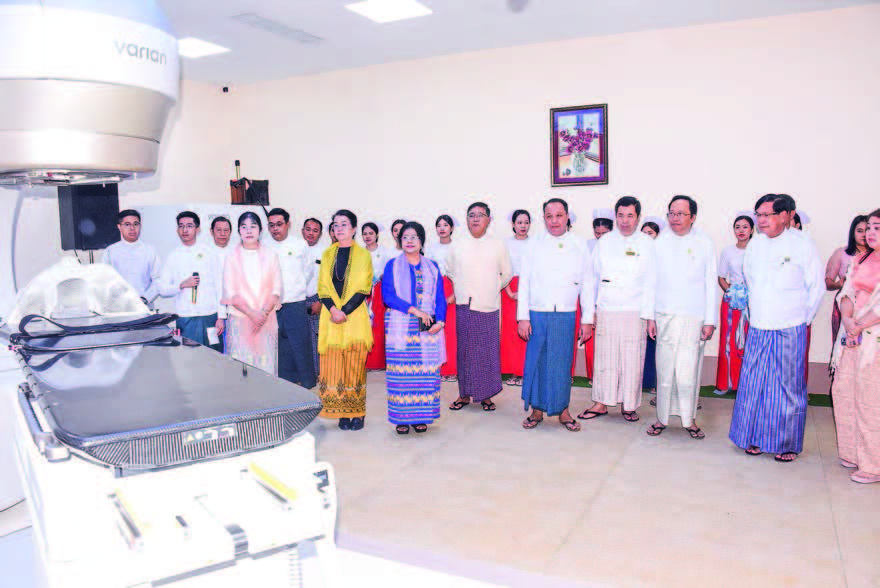A ceremony to launch the use of Linear Accelerators (LINAC) took place at the National Cancer Treatment Centre being built in Dagon Myothit (Seikkan) Township of Yangon Region yesterday morning.
Union Minister for Health Dr Thet Khaing Win and Yangon Region Chief Minister U Soe Thein cut the ribbon to open the Radixact, Halcyon, CT Simulator and Vital Beam machine rooms.
The Radixact machine enables rapid treatment for brain and spinal cord cancers, pediatric cancers, and large-sized tumours. The Halcyon machine allows for the fast treatment of a wide variety of cancers, enabling care for many patients. The Vital Beam machine offers a range of radiation intensities and energies, allowing flexible usage as needed and effective treatment for various cancers, including skin cancer.
Attendees to the ceremony visited the machine rooms and supporting machines and presented gifts to patients.
Speaking on the occasion, the Union Minister for Health delivered a speech, saying that the Ministry of Health, with the assistance of the State Administration Council, is prioritizing the enhancement of access to high-quality cancer treatment within the country. To address the growing need for cancer care services, short-term and long-term plans are being developed and implemented.
In the post-COVID-19 recovery period, efforts were made to fully restore the operations of cancer treatment centres. As part of these efforts, new LINAC machines were installed for use – one at Mandalay General Hospital in 2023 and another at Yangon General Hospital in 2024.
He continued that efforts are being made to systematically train and produce human resources, including oncology specialists and medical professionals skilled in cancer treatment. In line with plans for cancer treatment and research, the National Cancer Treatment Centre has been established and implemented with a structured approach. From now onwards, three LA machines will be operational, and due to the dedicated efforts of healthcare professionals working tirelessly day and night, the number of patients treated per day will increase to a total of 200 to 400.
It has been arranged to ensure convenient transportation and dining for patients to receive treatment with peace of mind, and housing has also been provided for healthcare workers.
With the nation’s extensive investments, efforts should be made to collaboratively maintain and safeguard the machines to ensure their long-term durability, enabling the provision of sustainable treatment for cancer patients. During treatment, healthcare providers are encouraged to act with compassion and empathy, interacting with patients respectfully and gently. Furthermore, it was emphasized to expedite the construction of the National Cancer Treatment Centre to establish it as a more advanced and reliable institution for the public. Collaborative efforts and unity are urged to achieve this goal.
The regional chief minister made a speech while the Rector (Medical Superintendent/Medical Services) of Yangon General Hospital spoke words of appreciation.
The Union minister and party inspected progress in the construction of the staff housings.
The National Cancer Treatment Centre implemented a project using over K32 billion from the State’s allocated funds. This included K9.2 billion for constructing a five-storey inpatient building at Dagon Myothit (Seikkan) Township Hospital, K16.9 billion for hospital machinery and related works, K4.9 billion for staff housings, and K1.4 billion for constructing a concrete storage facility for managing radioactive hospital waste and related tasks. Furthermore, the Ministry of Construction’s Task Force 1 is taking responsibility for the construction of an eight-storey inpatient building, which is expected to be completed within 2025.
The value of the three cancer treatment machines inaugurated today amounts to K32.5 billion. Moreover, the value of the CT Simulator, which is used alongside these machines to assist in radiation therapy, is reported to be K2.55 billion. — MNA/TTA


